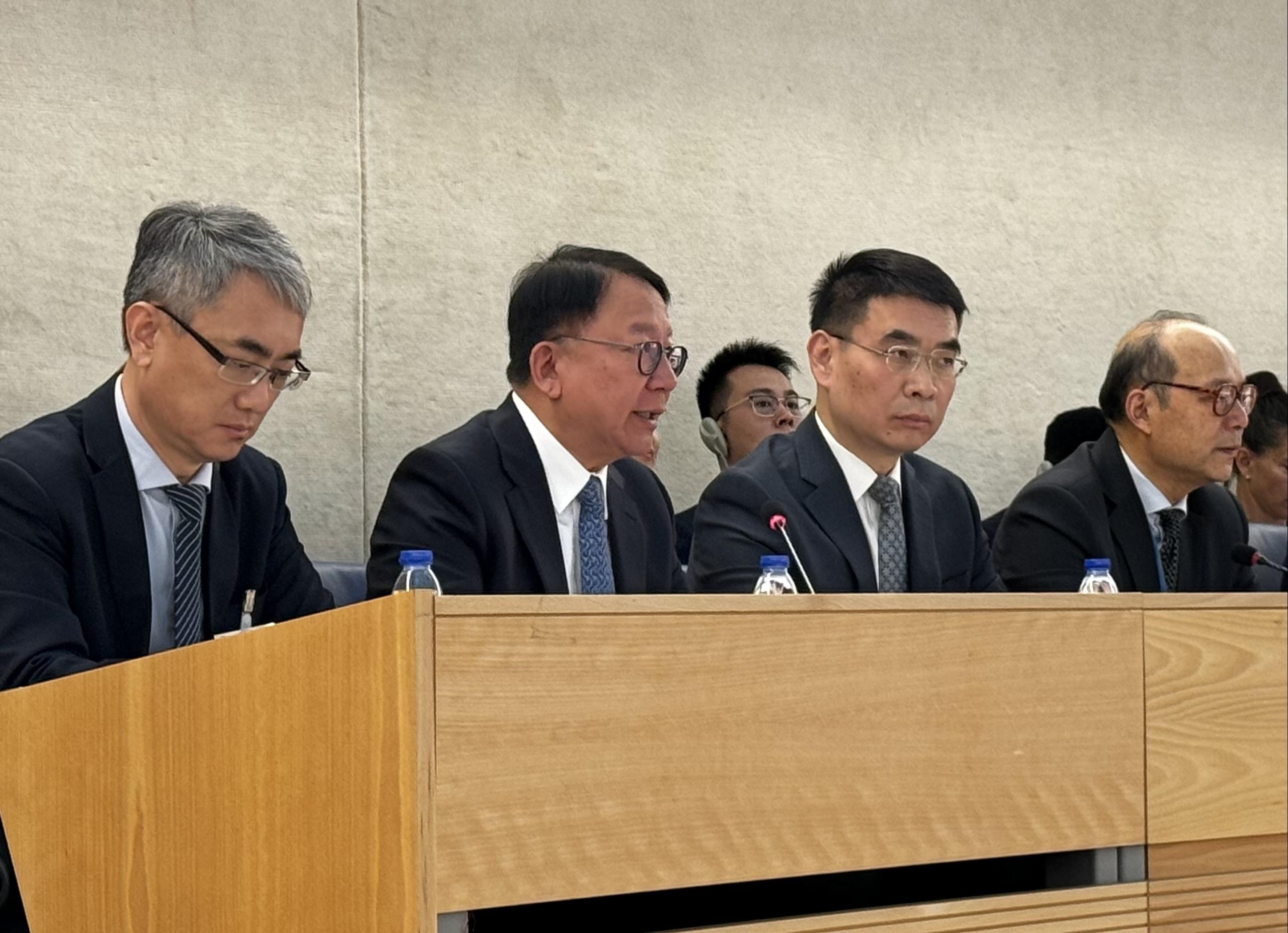Firm and robust response by CS on human rights situation of HKSAR at UNHRC Universal Periodic Review Working Group meeting (with photo)
The Chief Secretary for Administration, Mr Chan Kwok-ki, attended the meeting of the Universal Periodic Review Working Group of the United Nations Human Rights Council (UNHRC) in Geneva, Switzerland, today (January 23, Geneva time). The Working Group examined China's fourth report, which includes a part concerning the Hong Kong Special Administrative Region (HKSAR), submitted under the Universal Periodic Review mechanism of the UNHRC.
Mr Chan, as Deputy Head of China's delegation, attended the meeting together with officials of the HKSAR Government as members of China's delegation. In addition to making opening remarks, he actively responded to comments and suggestions about the HKSAR's human rights situation from meeting participants, and sternly refuted the unfounded and untrue remarks from a small number of countries.
The HKSAR Government will continue to fully co-operate with the motherland in the Universal Periodic Review of the UNHRC. It will also continue to tell the international community good stories of the HKSAR's human rights situation in a reasoned and robust manner.
Following is the response made by Mr Chan at the meeting today:
Mr President,
Various comments and concerns on Hong Kong were raised today. However, some of these clearly come from misconceptions and a lack of understanding about our real situation. I am pleased to explain.
No country will watch with folded arms in the face of acts and activities that endanger national security. For those who doubted the need for the Hong Kong National Security Law, let me bring you back to the darkest times of Hong Kong in 2019. Violent and random assaults took place on our streets like never before. Thousands of petrol bombs were thrown; public property was destroyed; traffic was brought to a standstill; and law enforcement officers were viciously attacked. Our community was traumatised. Radical forces blatantly advocated "Hong Kong independence" and sought foreign interference, jeopardising our nation's sovereignty, security and development interests.
The Hong Kong National Security Law was enacted precisely to tackle this situation: to bring back stability, security, as well as the rights and freedoms which people in Hong Kong had been deprived of during such a period of serious violence. Its implementation has played an important role, allowing Hong Kong residents to return to their peaceful and prosperous way of living.
Fundamental rights and freedoms, including freedom of speech and of the press, etc, are guaranteed by the Basic Law at the constitutional level. Article 4 of the Hong Kong National Security Law clearly stipulates that human rights shall be respected and protected in safeguarding national security. Any measures or enforcement actions taken under the Hong Kong National Security Law must observe this principle.
Many rights and freedoms are not absolute, and the ICCPR (International Covenant on Civil and Political Rights) clearly states that they can be restricted by law where necessary to ensure national security or public order, or to protect the rights and freedoms of others. As a matter of fact, Hong Kong fully complies with all applicable provisions of the ICCPR and other relevant international covenants.
Law enforcement actions are taken strictly in accordance with the law, including the protection of fundamental rights. Such actions are entirely based on available evidence and applicable law, and have nothing to do with a person's background, occupation or political stance.
I wish to make it clear that it is inappropriate to comment on, or interfere with, the ongoing legal proceedings which were mentioned today. Judges decide national security cases independently in accordance with the law. The suggestion that certain individuals or groups should be immune from legal consequences for their illegal acts is no different from advocating a special pass to break the law. This totally runs contrary to the spirit of the rule of law.
It is the legitimate right and duty of every state to safeguard its national security, and to do so by enacting laws is in line with international practice. In fact, it is our constitutional responsibility to enact local legislation to safeguard national security. The provisions of the Basic Law, including those on the protection of human rights, will be fully observed when we take forward the legislative exercise.
Mr President, the HKSAR Government is firmly committed as ever to the protection of human rights and always seeks to make improvements suited to Hong Kong's realities. We have expanded support for women, children, the elderly, the disadvantaged, the ethnic minorities, our imported workers, etc; and we have emerged from challenges with even greater strengths. With the strong support from our country, we will continue to better harness our unique institutional strengths in a new chapter from stability to prosperity. Thank you.
